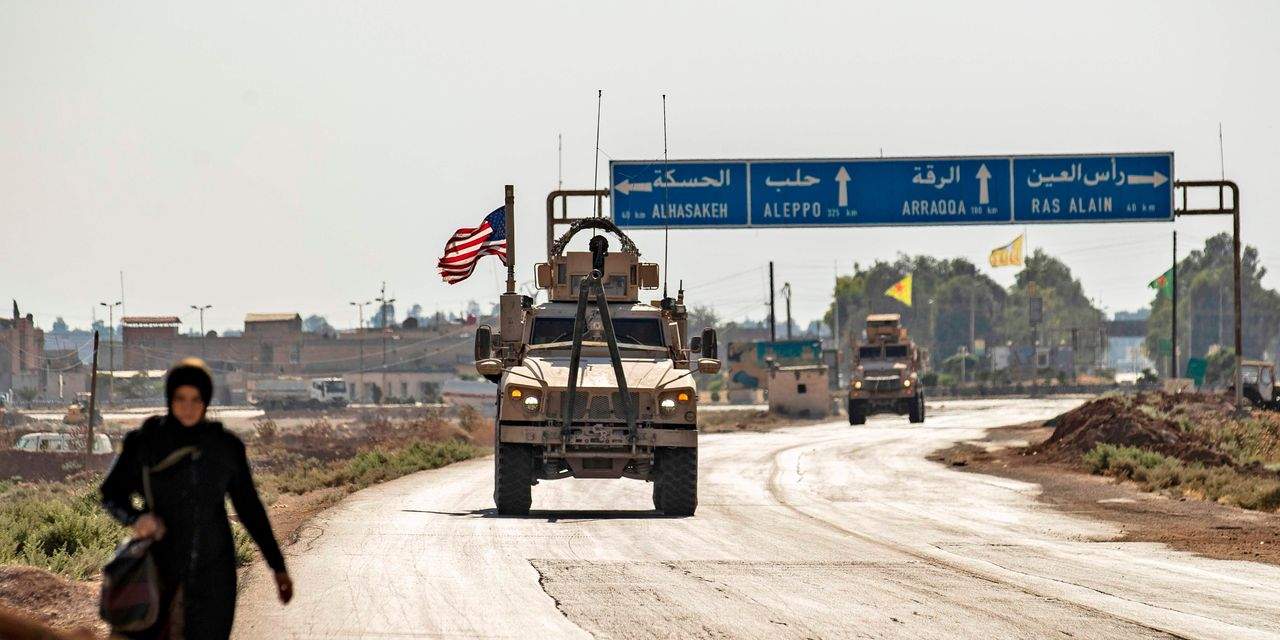U.S., Russian Vehicles Collide in Syria, Injuring Several Americans

Several American troops operating in northeast Syria were injured Tuesday when the vehicle in which they were riding was struck by a Russian military vehicle, according to U.S. officials.
The collision, which some U.S. officials believe may have been deliberate, was considered serious enough to raise with Moscow through U.S. military channels, a senior Trump administration official said.
The Pentagon said the chairman of the Joint Chiefs of Staff, Army Gen. Mark Milley, spoke with the chief of the Russian General Staff, Gen. Valery Gerasimov, by phone Wednesday, but declined to provide details of the discussion.
In a statement issued later in the day, a National Security Council spokesman described the Russian actions as a “breach of deconfliction protocols” and said Russian troops had acted in an “unsafe and unprofessional” manner.
No gunfire was exchanged in the incident, and the NSC statement noted that the U.S. patrol had left the area “to de-escalate the situation.”
Gen. Gerasimov said in the phone call that U.S. forces had blocked a patrol of Russian military police that was moving in the area, Russian news agencies reported a defense ministry statement as saying.
“In response, Russian military police took necessary measures to prevent an incident and carry out its orders,” the statement said.
Russian military personnel have been in Syria since 2015 in support of forces loyal to President Bashar al-Assad.
There has been considerable friction between Russian and U.S. forces, especially since President Trump decided to withdraw U.S. troops from much of northeast Syria last year while retaining control of a smaller area near the country’s oil and gas fields.
Russian ground patrols soon began to operate in the areas vacated by the U.S. military. The spate of recent incidents has been seen by American officials as an attempt by Moscow to pressure the Trump administration to remove the estimated 500 U.S. troops that remain in the oil-rich areas Russia and the Assad regime are believed to covet.
The Tuesday episode took place around 10 a.m. local time when a U.S. security patrol encountered a Russian military patrol near the town of Dayrick in northeast Syria, the NSC said.
Video of the episode, which has circulated on social media and which U.S. officials said was authentic, showed the Russian military vehicle colliding with a U.S. mine-resistant, ambush-protected vehicle, or MRAP, as a Russian helicopter flew overhead.
The statement by the NSC spokesman confirmed that U.S. troops had been hurt, but didn’t detail the nature of their injuries. Some of the U.S. troops suffered concussions, said a U.S. official.
The Russian embassy in Washington didn’t respond to a request for comment.
Russian incursions into Syrian areas controlled by U.S. troops have occurred on a “regular but often sporadic basis,” according to the U.S. military task force that is charged with fighting Islamic State.
In May, according to a July report by the Pentagon’s Inspector General, a Russian truck convoy encountered U.S. armored vehicles in the Syrian town of Tal Tamr. In June, the U.S.troops encountered a Russian patrol in northeast Syria whose presence hadn’t been made known through the two sides’ notification procedures, the Inspector General report added.
James Jeffrey, the top U.S. envoy for Syria, said in February the Russian incursions were intended “to challenge our presence in the northeast.”
“These are not daily occurrences, but they have been increasing in number, and thus it is troubling,” Mr. Jeffrey said then.
A formal memorandum was signed in 2015 to deconflict military aircraft flights and avoid airborne mishaps and altercations. A phone line between the two sides has also allowed for routine dialogue between the two militaries to ensure neither got into each other’s way. That agreement, which has been updated, has generally worked, officials said.
Brett McGurk, who resigned his post as the top U.S. envoy to the coalition fighting Islamic State after Mr. Trump ordered the withdrawal of American troops from Syria in 2019, complained that the Trump administration had left U.S. forces in a vulnerable position.
“Russian military forces are ramming and injuring US troops in Syria. No competent C-in-C would leave our troops in this position,” tweeted Mr. McGurk, who has endorsed Joe Biden’s presidential bid. White House officials didn’t immediately respond to a request for comment on the criticism.
Photo: U.S. forces patrol in Syria’s northeastern Hasakah province. - PHOTO: DELIL SOULEIMAN/AGENCE FRANCE-PRESSE/GETTY IMAGES











